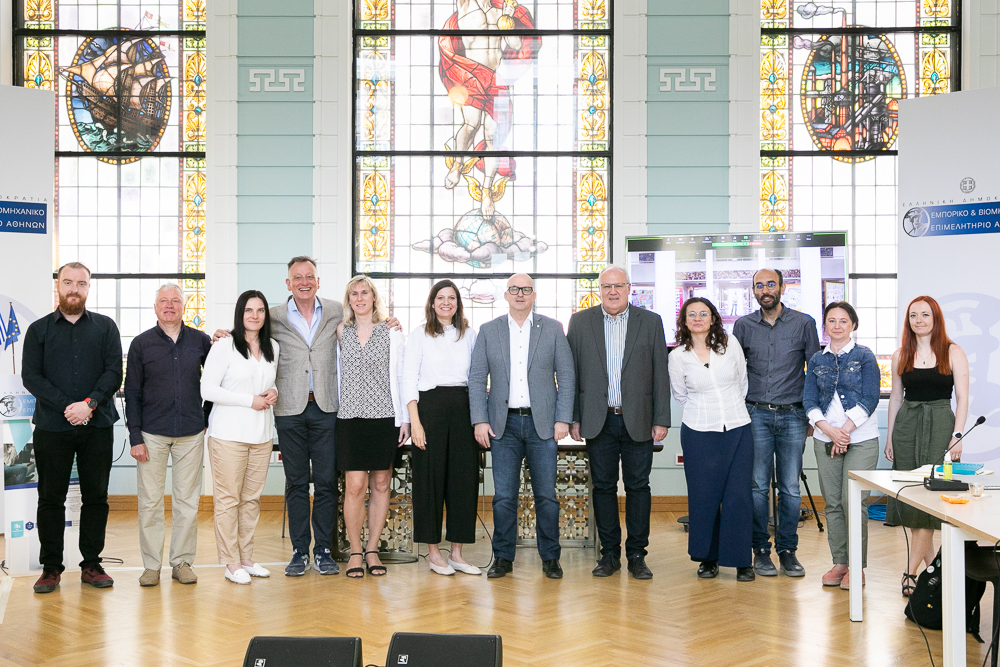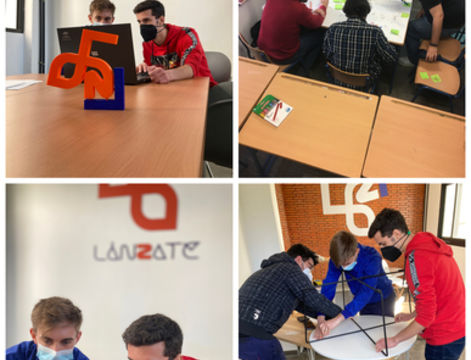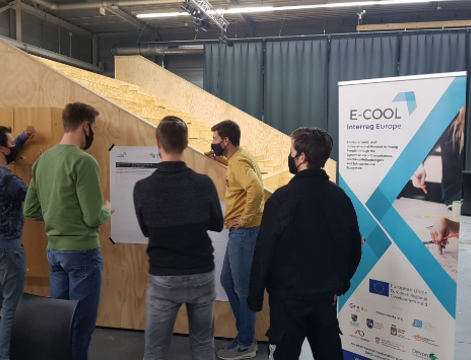
Meeting again in Athens
We were finally able to meet again in Athens for our steering committee meeting.
Promoting entrepreneurship is an important driver of smart, sustainable and inclusive economic growth and it has been a prime objective of the EU regions since the EC included it into the 2020 Strategy. Improving Entrepreneurship has both economic and social benefits; it is not only a driving force for job creation, competitiveness and growth, it also contributes to individual’s personal fulfilment and has an impact on a range of social objectives too. Consequently, the EU encourages initiatives aimed at developing Entrepreneurship to unlock the growth potential of businesses and people. However, self-employment itself is not a personal goal for Europeans generally, with only 37% of Europeans (Eurobarometer 2012) stating they would like to be self-employed.
The Entrepreneurship Action Plan, adopted by the EC in 2013 to reignite Europe’s entrepreneurial spirit, includes initiatives for educating young people on entrepreneurship. To ensure that the EU economy remains globally competitive, younger Europeans need to be motivated and inspired to develop their entrepreneurial mindset. The EU 2020 Action Plan suggests that young people who are given the opportunity to receive a specialised entrepreneurship education are more likely to start-up a business and are better equipped to tackle challenges in both their professional and personal lives.
All good reasons to ensure a better quality entrepreneurship education for our young people. Most approaches in recent years have focused on improving the skills or competences young people should gain within the education system. However, an integrated approach is needed, where their school, friends, family and the social environment, all play their part, to create an environment where entrepreneurial mindsets, attitudes and ideas can flourish.
E-COOL will identify and exchange –through a quadruple helix approach:
The good practices and lessons learnt will be transferred into Action Plans to be included in regional policies.
€1,730,135.00
SME competitiveness
The objective of Andalusian ROP TO3 is to promote entrepreneurial spirit and new business models for SMEs, which shall impact positively on the population. Investment Priority (IP) 3.1 promotes entrepreneurial spirit, facilitating the exploitation of new ideas and enhancing the creation of new enterprises. It includes actions for raising awareness on entrepreneurial activities through information, promotion and dissemination. To support entrepreneurial spirit and promote a better social recognition of entrepreneurs and enhance the culture of taking risks, the following actions are defined: agreements with organizations to implement information activities to promote entrepreneurial spirit; actions for promoting and disseminate an entrepreneurial culture addressed to potential entrepreneurs; information campaigns addressed to the society aiming to extend a positive image of entrepreneurs. This TO3 and IP has connections with OT2, which includes an IP for creating better entrepreneurship ecosystems involving entrepreneurs, enterprises and education centers; and also with ESF OP TO8, whose IP 8.3 promotes self-employment, entrepreneurial spirit and business creation; including actions for enhancing entrepreneurial culture in education centers and reinforcing values such as personal autonomy, joint work, creativity, initiative, innovation and entrepreneurship. It is essential to improve these policies in a region with high unemployment rates and a low desire to be entrepreneur.
The Regional Action Plan for Education Development (RAP) is a regional document for the development of strategic planning in the field of education in the South Moravian Region, fulfilling the priorities of the Operational Programme Research, Development and Education in the Czech Republic. The programme will emphasise the connection between education and the labour market in line with the priorities of the Europe 2020 strategy: “Growth promoting inclusion”, namely the key activity “Programme for New Skills and Jobs”. The RAP activities follow up Priority Axis 3 of the OP RDE - specific objectives 3 - Developing a system of strategic management and quality assessment in education - and 5 - Education quality enhancement and vocational training, including their greater relevance for the labour market. The RAP has 8 priority areas and one of them is the support of skills for enterprise, initiative and creativity. Regional action plans for education development was prepared and during next few years will be implemented and evaluated; besides are instruments to implement measures of the OP RDE, primarily for vocational training and its relevance for the labour market. During the RAP preparation a functional cooperation system in the area was introduced. A pre-condition was to enable the involvement of representatives from all secondary schools within the region, extracurricular education institutions, parents, business representatives and other key players in the region.
The objective of the operational programme is to define the priority axes of the assistance from the European Union funds in accordance with the Europe2020 Strategy, National Development Plan of Latvia for 2014-2020, National Reform Programme, European Union Council recommendations on the National Reform Programme 2013 of Latvia and delivering a Council opinion on the Convergence Programme of Latvia, 2012-2016, national sectoral strategies and other planning documents, as well as to define the general principles for the introduction, monitoring and evaluation of the European Union funds mentioned in the operational programme. The specific support objectives were defined for implementation of the priority axes and investment priorities. The support within the bounds of the priority axis ‘Research, Technology Development and Innovations’ will be provided for promotion of the development of science, research and innovations by improving the research facilities, strengthening the capacity of the scientific human resources, promoting the international co-operation possibilities, co-operation between the scientific institutions and the private sector, supporting the transfer of technologies, the commercialisation of the research results, as well as the development of new and scientifically intensive products and technologies and their introduction to the production.
The Regional Operative Programme 2014-2020 addresses the development needs of regions, amongst others regarding SME competitiveness in all sectors. Priority 2 of the Regional Operative Programme targets improving the competitiveness of small and medium enterprises. The main activities supported by this investment priority of the Priority Axis no. 2 - Improving the Competitiveness of Small and Medium Enterprises are:
• construction / upgrading and expansion of the production / service space of micro-enterprises, including endowment with tangible and intangible assets;
• creating / upgrading / expanding business incubators / accelerators, including the development of related services.
The Investment Priority of the ROP - Priority Axis 2 is “Promoting entrepreneurial mindset, in particular by facilitating the economic exploitation of new ideas and stimulating the creation of new firms, including through business incubators”. Unfortunately under the previous Operational Programme 2007-2013 no relevant measures to introduce education methodologies for entrepreneurial mindset in secondary education system were included. Nowadays, and from the point of view of the future societal and labour market needs it is necessary to introduce specific measures under the ROP regarding education methodologies for entrepreneurial mindset in secondary education system.
HotSW LEP ESIF is consistent with the EUROPE 2020 strategy to achieve smart, sustainable and inclusive growth by identifying ways to encourage and support entrepreneurship and enterprise. The LEP’s ambition to maximise the conditions for growth and employment opportunities are reflected within their place, business and people themed priorities.
The majority of Heart of the SW businesses, particularly in rural areas, are SMEs with fewer than five employees, providing an entrepreneurial heartland rich in diversity and potential to grow. Therefore the enhancement of SME competitiveness is a fundamental objective. In line with Thematic Priority 10. Investing in education, training and lifelong learning skills, enterprise and business competiveness will be developed through further investment in entrepreneurial activities to create the next generation of SME owners and managers.
Inside the T.O. 8 “Promote sustainable employment and support labour mobility” we refer to the specific objective 8c) Increasing young people employment.
The Region intends to reduce the increasing rate of youth unemployment by funding active policies of inclusion and occupational reintegration. The youth employment increase is a crucial goal in the regional strategy for the next seven years. The aggravation of the phenomenon of so-called “Neet” also requires a focus on this target. For this reason, it is expected to invest, as part of this objective, an important commitment through actions that will cover vocational training, aid for employment, entrepreneurship and active policies of inclusion and occupational reintegration.
In particular, the Puglia Region intends to support groups of young people who want to test, experiment in the field, discover opportunities and professional vocations, starting from the problems and opportunities of the territory.
To facilitate the creation of enterprises by young people, the region, in line with the Commission's guidelines, is already implementing a strategy of support for new businesses made by disadvantaged people, in particular young people, and to improve access to credit through the use of financial instruments.
The Northern Netherlands (NNLs) RIS3 aims at broadening and connecting value chains, creating ‘cross overs’ between sectors and technologies. It supports existing and new businesses and knowledge institutes to invest in new chains, products and markets. Pivotal in this process are existing and new SME’s. Entrepreneurship, entrepreneurial spirit and new international and expanding SME’s are a key requirement for the Northern Netherlands. Analysis has shown that existing SME’s appear to be insufficiently capable of exploiting existing knowledge and generating new knowledge. New Startups (many times started from student/university startup level) are mainly based on new knowledge and technology. RIS3 addresses these issues by: Fostering collaboration between businesses and between businesses and knowledge institutes; Improving access to knowledge and effectiveness and accessibility of support measures; Fostering entrepreneurial spirit, Startups and expanding SME’s.
The knowledge available within the region is insufficient to come to solutions, so cross border collaboration plays a key role in this respect. New partnerships are envisaged to be developed, and existing partnerships are encouraged to be extended.
The policy instrument aims to strengthen the knowledge base of SME’s to ensure that they are better equipped to exploit existing knowledge and generate new knowledge. RIS3 is directly related to the NNLs Operational Programme ERDF through IP 1.b, SO B.
The main objective of the Attica ROP, Thematic Objective 3 & Investment priority (IP) 3a is promoting entrepreneurship, in particular by facilitating the economic exploitation of new ideas and supporting the creation of new businesses, among others through business incubators. Its characteristics is that within the framework of this IP promotes the creation of new businesses and the adaptation of existing ones to areas of high added value, with a view to facilitating the economic exploitation of new ideas, business discovery and Networking of SMEs. In addition it is connected with the regional strategy on employment and reducing the problems in finding direction to work for young people and reducing poverty. The policy is among others a solution to the high unemployment rates (22%) in the region. It is of a high priority for the region and also an IP included in the RIS3 of Attica. It is strongly connected with the objectives in the ESF strategy Axis 8 of the ROP of Attica) include economic, social and environmental aspects, promoting the sustainability and quality of employment and to facilitate labor mobility, includes the Investment Priority 8iii self-employment, entrepreneurship and the creation of new businesses, and especially innovative micro, small and medium-sized enterprises. The policy instrument needs to be improved sharply, as the region & especially the city of Athens, faces enormous structural employment problems due to the continuing economic crisis in Greece.
The main objective of the Operational Programme Competitiveness and Cohesion 2014 – 2020, Thematic Objective 03 & Investment priority (IP) 3a and 3d is promoting entrepreneurship, in particular by facilitating the economic exploitation of new ideas and supporting the creation of new businesses, among others through business incubators.
OPCC interventions under TO3 will thus focus on investments into:
• promoting entrepreneurship, in particular by facilitating the economic
exploitation of new ideas and fostering the creation of new firms, including through business
incubators;
• provision of better access to finance for SMEs;
• enabling favourable environment for business creation and development;
• supporting the capacity of SMEs to grow in regional, national and international markets, and to
engage in innovation processes;
• improving SMEs' development and growth and
• enhancing SMEs’ innovativeness and entrepreneurial learning as a key competence.
The policy instrument needs to be improved especially related to the status of entrepreneurial learning as a key competence in all level of education, introducing smart skills and enhancing innovativeness for building entrepreneurial eco-system.
The objectives of the Voivodeship of Opolskie ROP are among others:
Priority line II:
- investment in the development of enterprises increasing the scale of their activity and range of the offer;
- support for new products and services in enterprises;
- support for business cooperation of enterprises at the national and international level.
- promoting entrepreneurship spirit in all ages and creating a better environment for entrepreneurship.
This policy instrument should be improved in order to simplify procedures and make available enhancements more accessible for young people.
Activities and goals of ROP are also connected with aims of Development Strategy for Opolskie Voivodship until 2020 and Regional Action Plan for Employment, as well as ROP VO TO8. Other priorities which may additionally be addressed within ROP VO TO8 would be the following:
Priority line VII:
- increasing employment opportunities for people in particularly vulnerable situations on the labor market;
- increasing the number of permanent jobs created by grants for business start-up;
- adjusting the potential of SME’s and the qualification of their employees to the needs of the regional economy.
Priority line IX:
- improving the students key competences and appropriate attitudes necessary for functioning on the labor market,
- enhancing the employability of future graduates in the regional labor market;
- improving the competences and qualifications.

We were finally able to meet again in Athens for our steering committee meeting.

The event was developed within the framework of Entrepreneurship Education Congress celebrated in Sevilla October 2021.

Two teachers from a vocational school in Granada share with us how they work with acquisition and development of entrepreneurship skills with their students.

IMC Weekend School aims to prepare young people aged 10-14 of all school levels for wholeheartedly taking up their roles in society.

SEN.SE (Special Educational Needs Somerset Expertise) aims to equip students with the life skills and qualifications they need to reach their potential.

E-COOL team in the Netherlands innovates involving students as stakeholders to assess the good practices of 10 partner regions.

English university excited about approach to student entrepreneurship in northern Netherlands

The Hanze University of Applied Sciences Groningen and the Alfa-college hosted the E-COOL Interreg Europe conference on 27 and 28 of November.

Zemgale Planning Region adapts “Giovani Innovators in Azienda” promoted by Puglia Region, launching a competition to develop entrepreneurial skills in students.

Domenico was awarded Young Entrepreneur of the Year by the European Commission. He has been actively involved in Apulian regional youth policy support actions